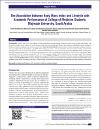The association between body mass index and lifestyle with academic performance of college of medicine students, Majmaah University, Saudi Arabia
| Author | Mohamed, Elsadig Yousif |
| Author | Sami, Waqas |
| Author | Almhmd, Abdalah Emad |
| Author | Alenazy, Sultan Homdi K |
| Author | Alrashidi, Abdulrahman Ghayeb |
| Author | Aldhafeeri, Bassam Mashhi |
| Author | Binmuhareb, Abdulaziz Nasser |
| Available date | 2023-02-07T05:50:01Z |
| Publication Date | 2022-11-26 |
| Publication Name | Advances in Human Biology |
| Identifier | http://dx.doi.org/10.4103/aihb.aihb_79_22 |
| Citation | Mohamed, Elsadig Yousif, Waqas Sami, Abdalah Emad Almhmd, Sultan Homdi K. Alenazy, Abdulrahman Ghayeb Alrashidi, Bassam Mashhi Aldhafeeri, and Abdulaziz Nasser Binmuhareb. "The association between body mass index and lifestyle with academic performance of college of medicine students, Majmaah University, Saudi Arabia." Advances in Human Biology 13, no. 1 (2023): 118. |
| ISSN | 2321-8568 |
| Abstract | Introduction: Obesity rates have risen rapidly in both industrialised and developing countries, across all age groups and genders. The researchers wanted to see if there was a link between body mass index (BMI) and lifestyle and academic performance among College of Medicine students at Majmaah University in Saudi Arabia. Materials and Methods: Male and female students studying at college of medicine who were registered for the academic year 2020–2021 studying in levels 2–6 were included in this cross-sectional study. A total of 269 participants were chosen as part of the sample. A pretested questionnaire was used to collect the information. Results: Males made up more than half of the participants (153, or 56.6%), with the majority (245, or 91.1%) being between the ages of 17 and 24 years. Participants' BMIs ranged from 15.2 to 43.2, with an average SD of 24.5 5.3. One hundred and fifty (55.8%) of the kids were of average weight. The statistical research indicated a link between cumulative grade point average (CGPA) and BMI. In comparison to the rest, normal-weight participants had a higher CGPA. Conclusion: Being a male, younger age, high family income, second-year level and parents' education are all linked to strong academic achievement, according to the study. Normal weight, nutritional and sleeping habits are also linked to good academic performance. |
| Language | en |
| Publisher | Medknow Publications |
| Subject | Academic performance Body mass index Medicine students |
| Type | Article |
| Pagination | 118-123 |
| Issue Number | 1 |
| Volume Number | 13 |
| ESSN | 2348-4691 |
Files in this item
This item appears in the following Collection(s)
-
Nursing Research [78 items ]


